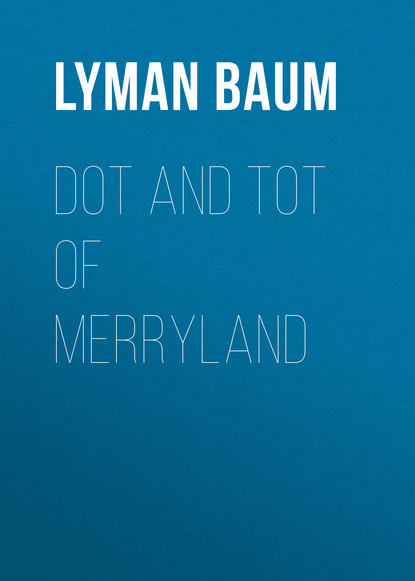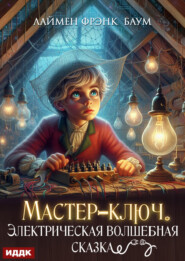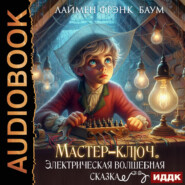По всем вопросам обращайтесь на: info@litportal.ru
(©) 2003-2025.
✖
Dot and Tot of Merryland
Настройки чтения
Размер шрифта
Высота строк
Поля
The children were somewhat tired by the adventures of the day, so when Flippityflop helped them to gain the room under his platform, they crept to the soft-cushioned benches that lined the walls and lay down. In less than a minute Dot and Tot were fast asleep, curled up side by side, with their arms entwined.
Next morning they were awakened by the strains of sweet music. Dot at once sat up and asked, "What is that?"
"That is my alarm clock," answered Flippityflop, who had been reclining upon a bench at the other side of the room. "It tells me when it is time to get up."
"It's a queer alarm clock," said the girl.
"But a very good one," returned the Clown. "It is really a big music-box under the bench, which starts playing every morning at seven o'clock. So, instead of being awakened by a rattling and clanging of bells, such as most alarm clocks make, I open my eyes with a sensation of pleasure, and get up feeling jolly and content.
"I think it's a lovely clock," said Tot.
"Won't you join me at breakfast?" asked the prince. "I'm going to have a dish of scrambled egg-shells and a few fried buttons. The eggshells make our complexion white and chalky, and we are very fond of them."
"I prefer to eat something from our basket," replied the girl. "But Tot may eat the egg-shells and buttons, if he wants them."
"Don't want 'em!" cried Tot. "Want bread and butter."
"Well, I declare!" said the Clown. "What peculiar tastes you children have!"
But he allowed them to breakfast from their own stock of food, and when the meal was finished Dot said, "We must be going now; but first I wish to thank you for the pleasant time we have had in your Valley. We enjoyed the Clowns very much indeed."
"Nice Clowns," declared Tot, with emphasis.
"I'm sorry to have you go," said Flippityflop, "but I suppose you cannot stay here always, especially as you are going to visit our Queen."
Then he carried the big basket down to the boat for them, and all the Clowns came to the river bank in a long procession, to bid them good-bye.
After they were seated in the boat and had begun to float out into the river again, the Clowns started singing a comic song, in one big chorus, as a farewell entertainment.
Dot and Tot laughed and waved their handkerchiefs at the jolly fellows until the archway leading into the next Valley was reached, and as the shadow of the rocks fell upon them and shut out their view of the First Valley of Merryland, they sighed and turned wonderingly to face whatever adventures might lie before them.
CHAPTER VIII. – The Second Valle
Gliding out of the archway into the Second Valley of Merryland, our little voyagers saw before them a big enclosure shaped like a diamond. Along two sides of this diamond the river ran very slowly, and upon the bank at their left rose a huge, straight wall of solid rock, that seemed, as they looked up, to reach to the clouds.
Upon the bank at their right hand, however, was a broad, flat country, which seemed at first sight to resemble any other beautiful valley, having trees and meadow, roads and fences, and a few pretty houses clustered near the river bank.
But on looking closer, Dot and Tot saw that all the trees had smooth trunks, with bright colors twisted around them like sticks of candy. The branches, though smaller than the trunks, had the same stick-candy appearance; while the leaves, which were of various colors, looked soft and thick, as if they were made of candy, too.
The houses were many-colored, being pink and brown and white and lavender, and the walls of all of them were as smooth as taffy. One big house, that was built exactly at the bend in the river, seemed to Dot to be made entirely of molasses candy, for it had the same color and appearance.
The trees and houses and fences were all smaller than one usually sees, but the brilliant colors made them look very pretty indeed.
The boat floated slowly toward the bend in the stream, and finally came close to the bank in front of the big molasses-candy house, where it stopped. Dot stepped out upon the bank and fastened the boat, and then Tot jumped out beside her. There was a little path, brown in color and rather rough, that led past the house and down to the river where they stood, and as Tot jumped upon this path he stubbed his toe and fell down. Then Dot saw him pick up a piece of the brown path that had become loosened, and after looking at it a moment put it into his mouth.
"Don't do that, Tot!" called the girl, in horror. "You mustn't eat mud."
"T'ain't mud," said Tot, with his mouth full. "It's fudge."
"Fudge!" echoed Dot. "You must be crazy, Tot." But she tasted a small piece herself and found that Tot was right. It was very nice fudge, too.
Just then as Dot was looking curiously toward the house, she saw the door open and a little man come out, followed the next moment by a little woman. They were not only very little, but short and very fat. The man wore a tall hat, a swallow-tail coat and tight breeches; but all his garments seemed fastened to him in some way, as if they were not made to come off, and their bright colors looked to have been painted on. The woman's dress had the same appearance, and the big Shaker bonnet she wore seemed really a part of her head.
When these people saw Dot and Tot, they stopped short and looked at each other in surprise; but the man seemed soon to recover himself and walked quickly toward the children, swinging a candy cane in his hand as he came.
"Good morning, my dears," he said, pleasantly.
"Good morning," answered Dot.
"Mornin'," said Tot.
"Will you kindly tell us how you came here?" continued the fat little man. "You must excuse my curiosity, but I cannot remember ever having seen any real children before."
"Our boat brought us," said Dot. "We're drifting down the river and have to go wherever it takes us."
"Oh, I see," said the man. "Well, since you are here, permit me to welcome you to the Valley of Bonbons," and he reached out his hand, with a graceful bow, to the little girl.
Dot shook hands with him, of course; but it made her shiver a little, the hand felt so soft and flabby; and when she withdrew her own hand she noticed upon it a fine white powder like flour. This she brushed off, but the little man laughed and said. "It's only powdered sugar, my dear. I'm obliged to keep myself covered with it, you know, so I won't stick to things."
"But – but I don't understand," stammered the girl. "Aren't you made like other people?"
"Certainly; I am made like everyone I have ever seen until I met you and this little boy. It strikes me you are the ones who are queerly made. You don't seem to be candy at all."
"Oh no!" said Dot, in a matter-of-fact way. "We're just flesh and blood and bones."
"And clothes," added Tot, who was looking with greedy eyes at the strange little man.
"Well, well!" said the man, thoughtfully tapping the ground with his cane; "what strange creatures you must be. In this Valley everyone is made of candy."
"And everything else is candy," exclaimed the little woman, who was peering over the man's shoulder and had not spoken before.
"Oh yes; everything we know of is candy except the river," continued the man.
"Are you candy?" asked Tot, with wide open eyes.
"To be sure. My bones are all made of stick candy and my flesh is marshmallow. That is why I must keep myself covered with powdered sugar; otherwise I would melt or stick to everything I touched. My wife is made in the same way, and we are very proud to know we are very pure and wholesome."
"What do you eat?" asked Tot, curiously.
"We eat candy, of course; that is what makes us so fat. Candy is very fattening, you know," said the little man cheerfully.
"But you haven't any teeth," remarked Dot, who had noticed this fact.
"Teeth! Certainly not. No one can eat much candy and still have teeth. Haven't you heard that candy always destroys a person's teeth?"
"I've been told so," replied Dot.
"But we get along very nicely without them. Indeed, our lives are decidedly sweet and peaceful."

















